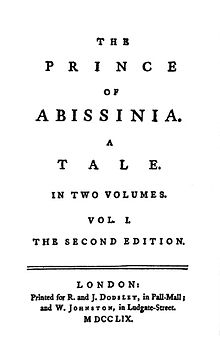The History of Rasselas, Prince of Abissinia

Cover of corrected Second Edition of 1759
|
|
| Author | Samuel Johnson |
|---|---|
| Original title | The Prince of Abissinia: A Tale |
| Country | United Kingdom |
| Language | English |
| Genre | Apologue, Theodicy, Fable |
| Publisher | R. and J. Dodsley, W. Johnston |
|
Publication date
|
April 1759 |
| Media type | |
The History of Rasselas, Prince of Abissinia, originally titled The Prince of Abissinia: A Tale, though often abbreviated to Rasselas, is an apologue about happiness by Samuel Johnson. The book's original working title was "The Choice of Life". He wrote the piece in only one week to help pay the costs of his mother's funeral, intending to complete it on 22 January 1759 (the eve of his mother's death). The book was first published in April 1759 in England. Johnson is believed to have received a total of £75 for the copyright. The first American edition followed in 1768. The title page of this edition carried a quotation, inserted by the publisher Robert Bell, from La Rochefoucauld: "The labour or Exercise of the Body, freeth Man from the Pains of the Mind; and this constitutes the Happiness of the Poor".
Johnson was influenced by the vogue for exotic locations. He had translated A Voyage to Abyssinia by Jerónimo Lobo in 1735 and used it as the basis for a "philosophical romance". Ten years prior to writing Rasselas he published The Vanity of Human Wishes in which he describes the inevitable defeat of worldly ambition. Early readers considered Rasselas to be a work of philosophical and practical importance and critics often remark on the difficulty of classifying it as a novel. Johnson was a staunch opponent of slavery, revered by abolitionists, and Rasselas became a name adopted by emancipated slaves.
While the story is thematically similar to Candide by Voltaire, also published early in 1759 – both concern young men travelling in the company of honoured teachers, encountering and examining human suffering in an attempt to determine the root of happiness – their root concerns are distinctly different. Voltaire was very directly satirising the widely read philosophical work by Gottfried Leibniz, particularly the Theodicee, in which Leibniz asserts that the world, no matter how we may perceive it, is necessarily the "best of all possible worlds". In contrast the question Rasselas confronts most directly is whether or not humanity is essentially capable of attaining happiness. Writing as a devout Christian, Johnson makes through his characters no blanket attacks on the viability of a religious response to this question, as Voltaire does, and while the story is in places light and humorous, it is not a piece of satire, as is Candide.
...
Wikipedia
